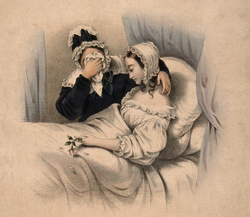Maria Carolina IV of Stradia: Difference between revisions
(Created page with "{{Infobox royalty | embed = | name = Maria Carolina | title = Holy Empress of Stradia, Grand duchess of Stradova, Queen of Coszéva, Queen of Bar...") |
No edit summary |
||
| Line 97: | Line 97: | ||
}} | }} | ||
'''Maria Carolina''', | '''Maria Carolina''', also known as '''Maria Carolina the Revolutionary''', was a significant figure in the history of [[Stradia]]. She was the reigning monarch of Stradia from 1815 until 1834, during which time she played a pivotal role in shaping the nation's political landscape. Maria Carolina is widely regarded as one of the most important monarchs in Stradia's history, owing to her progressive views and her willingness to relinquish her own power for the greater good of the nation. | ||
Maria Carolina is particularly known for her role in drafting and enacting Stradia's first constitution, which granted important rights and protections to the nation's citizens. This groundbreaking document was a major step forward for Stradia, which had previously been ruled by absolute monarchs with little regard for the welfare of their subjects (except for [[Antonia the Great]]). Under Maria Carolina's leadership, Stradia embarked on a path of political reform and modernization that would continue to shape the nation for generations to come. | |||
Throughout her reign, Maria Carolina was known for her intelligence, her charisma, and her unwavering commitment to the well-being of her people. She was a beloved figure among the Stradian populace, who viewed her as a symbol of hope and progress. Her legacy continues to be felt in Stradia and beyond, as she remains a source of inspiration for those who seek to promote democracy, freedom, and justice. | |||
==Early life== | ==Early life== | ||
Revision as of 18:49, 8 May 2023
| Maria Carolina | |||||
|---|---|---|---|---|---|
| Holy Empress of Stradia, Grand duchess of Stradova, Queen of Coszéva, Queen of Bartova, Hetmanina of Taridia, Grand princess of Sovalda, Queen of Cosiva, Governoress of Vrabanten, Grand duchess of Lourgine, Protector of Mähkante | |||||
 | |||||
| Reign | 1815 – 1834 | ||||
| Predecessor | Antonia II of Stradia | ||||
| Successor | Joseph V of Stradia | ||||
| Born | Schönfeld palace ,Walsten, Stradian empire | ||||
| |||||
| house | Brazza | ||||
| Father | Joseph IV of Brazza | ||||
Maria Carolina, also known as Maria Carolina the Revolutionary, was a significant figure in the history of Stradia. She was the reigning monarch of Stradia from 1815 until 1834, during which time she played a pivotal role in shaping the nation's political landscape. Maria Carolina is widely regarded as one of the most important monarchs in Stradia's history, owing to her progressive views and her willingness to relinquish her own power for the greater good of the nation.
Maria Carolina is particularly known for her role in drafting and enacting Stradia's first constitution, which granted important rights and protections to the nation's citizens. This groundbreaking document was a major step forward for Stradia, which had previously been ruled by absolute monarchs with little regard for the welfare of their subjects (except for Antonia the Great). Under Maria Carolina's leadership, Stradia embarked on a path of political reform and modernization that would continue to shape the nation for generations to come.
Throughout her reign, Maria Carolina was known for her intelligence, her charisma, and her unwavering commitment to the well-being of her people. She was a beloved figure among the Stradian populace, who viewed her as a symbol of hope and progress. Her legacy continues to be felt in Stradia and beyond, as she remains a source of inspiration for those who seek to promote democracy, freedom, and justice.
Early life
Reign (1815–1834)
Coronation (1815)
Foreign affairs
Arts and culture
Personal life
Marriages
Children
Antonia became a fierce activist for socialism and feminism.
In the summer of 1832 Antonia knew her time was coming. She asked her mother to come to her estate in the country to spend some time with her. Antonia used this time to make amends, cherish her friendships, and strengthen her bond with her mother. On the 14th of August, Maria Carolina woke up next to her daughter looking over to her only to see her no longer breathing. Antonia had passed away peacefully in her sleep. She died at the age of 21.
A large state funeral was held and a national time of morning was announced.
